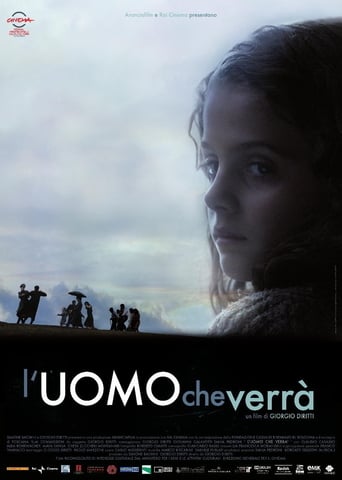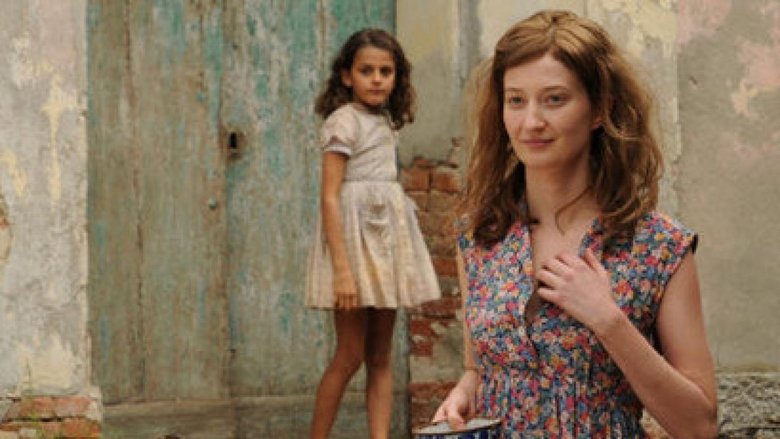

The Man Who Will Come (2009)
A group of Italian villagers struggle to survive during a tumultuous time in 1943, debating how much assistance to give the partisans with the impending arrival of the Germans. Based on True Events.
Watch Trailer
Cast


Reviews
It's a bit of a challenge to take on and get across the full impact of the Marzabotto massacre, the worst war-time atrocity committed in Italy during WWII, and director Giorgio Diritti takes a bit of a risk in L'uomo che verrà (The Man who will Come) by viewing events from the perspective of an 8 year old girl. The approach however neither shies away from the very real horror of the events of September 1944 nor sentimentalises them, but presents the story in a shockingly realistic and matter-of-fact way.Life in the Monte Sole region of Italy, in the mountains south of Bologna, is difficult enough for the inhabitants of the small farming community in the winter of 1943. The work is hard, the people live in poverty and are put under further strain by the taxes and regulations of the fascist government. The pact between Mussolini and Hitler however has just broken down and the German troops who patrol the region have suddenly become a more threatening presence.For the first half of the film we only get a sense of this from the perspective of Martina, an 8 year old girl. Unaware of what is really going on, her view is one of an innocent gradually coming to an awareness of the nature of the world. No longer speaking since the death of her baby brother, Martina is a silent witness to the world around her, to the struggle to survive. Most of her experiences are typical of childhood; she's bullied at school, is gradually becoming aware of what goes on between men and women, and is looking forward to her mother giving birth to a new baby.On the other hand, Martina also experiences horrors no child should ever be expected to witness. She sees German troops ambushed and prisoners being executed in the woods, hears the bombardment of Bologna, and experiences first-hand the events of the 28th and 29th September 1944 when she is rounded up with the other villagers by a Waffen SS unit. Accused of sheltering the Partisan units hiding out in the woods who have been attacking their patrols, the SS brutally execute around 770 citizens of Marzabotto; men, women and children alike.This horrifying true-life event is filmed by director Giorgio Diritti without sentimentality and without exaggeration and it's all the more shocking for it. Despite the necessity of having to create a fictional family and present a child-like narrative viewpoint as a way to navigate through the events, L'uomo che verrà nonetheless is unmanipulative and has an authentic feel for the period, the poverty and the hardship experienced, sparing the viewer little of the horror of what really happened in the region in 1944. L'uomo che verrà won the Best Film award in Italy's 2010 David di Donatello awards.
I have been urged by a friend to go and watch this "masterpiece" - his expression - and rarely I have received such a sound advice."L'uomo che verrà" is a compelling tale, one bathed in the memories of many people who still remember the horrors of WWII through family stories. It is also a neorealist work of art, delicately balanced between the crudity of war and the simple life of peasants, ordered by the rhythm of the seasons and their deep Catholic faith. The arrival of war in their life is at first slow, but it accelerates towards the tragical end. The massacre of Marzabotto (as it is still known) is one of the tragedies of Italian war: here it is told through the point of view of a small girl, who is able to save her newborn brother (the man who will come, as the title says, pointing to future generations). The way she looks at the tragedy unfolding before her eyes becomes our point of view: the same happens with the others. Diritti knows how to tell the history of the massacre without letting us feel righteous: compassion for the victims comes first.It is a work of love, which excels for lyrical realism and historical balance. I recommend it to anyone who wants to keep remembering what has been done in the name of hate.
Between September 29 and October 5 1944 on Monte Sole, an area of the Appenine Mountains near Bologna, S.S. Officer Weder reported "the execution of 728 bandits." These "bandits" were in fact around 770 civilian inhabitants of the area - women, priests, the elderly, and over two hundred children - who were systematically killed by the local SS troops in a sweeping reprisal for partisan activity in the area. "L'Uomo Che Verrà" ("The Man Who Will Come") re-enacts the event through the eyes of a young girl who observes the world in silence.Working oneself up to seeing such a film is nearly always a task - we know how it will end, and we know it will be devastating. But as the beginning of the film focuses on the everyday lives of Martina (a little girl gone mute ever since her baby brother died in her arms) and her family, one almost forgets the film's grim destination. Almost.The film is fanatically, sometimes brutally, devoted to portraying real life. There are no heroes (except for perhaps Martina herself), and very few clear villains (except for perhaps one or two of the SS who mark themselves out); there is no love story, and, eventually, no easy release from the horror. The partisans are neither heroic saviors nor selfish bandits; merely men who are waging battle against the invaders, sometimes committing ugly acts as a matter of course. The colors in the cinematography sometimes resemble old photographs, the clothes are dirty, torn, and in the case of the little girl, almost outgrown, and, realistically, nearly all the dialog is spoken in Bolognese dialect, which is so foreign from standard Italian that nearly the entire movie is subtitled in Italian for the benefit of audiences on the rest of the peninsula.It is also beautiful. The cinematography shows the Appenines in all their green, stark glory, and the moments of happiness and peace and laughter that the family find even in wartime, though they contribute to the realism rather than soften it, render the film bearable and lend it beauty.While we in the Western hemisphere are aware of the horrors of Holocaust, Normandy, and war the Pacific, the ugly and frequently horrifying Italian front has long gone ignored or forgotten. Once this film is released with English subtitles, with any luck, this omission might be remedied.
"The Man Who Will Come" is a drama set in an Italian's region, the Romagna (and not the Tuscany, although many shots come from there), during the II world war. The movie tells an interesting and cruel episode of the passing of the front in Italy: the Slaughter of Marzabotto, a dreadful tragedy, which becomes greater because of the number of children involved (more than two hundreds less-twelve-years-old children). This is the reason for the title, something like a dedication of the movie to children ("The Man Who Will Come" is a baby who survives to tragedy, he represents the generations of tomorrow), and in order to make stronger this connection history-childhood, a female child who doesn't speak is the protagonist of the movie. Director's aims, when he decides to coming this project, as he said recently, were two: to bring the spectator in a time travel, in a reality unknown for many people, and to narrate the war from the child's point of view. Probably, with this movie he reached to bring the spectator in the past (the choice to use the dialect, as Visconti's La Terra Trema, gives more realism to the narration, and makes the movie more eclectic than the others with the same themes; the care for details, from the lights to the clothes, is almost obsessive) but I think the point of view of the young female is just a little part of the movie: final point of view is quite objective, because there are many points of view, and this gives the taste of a good historical reconstruction. To say that this movie shows the war from the child's point of view is probably reductive, or just wrong: a movie which shows the point of view of a child in some historical period is very different from this work. Result? Nice job, but it's impossible to have an historical reconstruction of facts through a subjective point of view or, if it's possible, this movie couldn't reach it.




